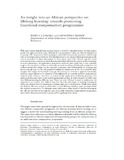| dc.contributor.author | Lekoko, R. | |
| dc.contributor.author | Modise, O. | |
| dc.date.accessioned | 2013-02-07T07:08:26Z | |
| dc.date.available | 2013-02-07T07:08:26Z | |
| dc.date.issued | 2011-02 | |
| dc.identifier.citation | Lekoko, R. & Modise, O. (2011) An insight into an African perspective on lifelong learning: towards promoting functional compensatory programmes, International Journal of Lifelong Education, Vol. 30, No. 1, pp. 5-17. | en_US |
| dc.identifier.issn | 0260-1370 | |
| dc.identifier.uri | http://hdl.handle.net/10311/1118 | |
| dc.description.abstract | This paper argues that lifelong learning can be a torch for education that is relevant, appropriate and appreciated by many Africans if conceptualized within the African Indigenous Learning (AIL) framework. Such learning is entrenched deep in the practices, cultures and ways of knowing of many Africans. The fundamentals or the ideals of lifelong learning in AIL can be presented in three dimensions of time, space, and I/We. Woven together, these concepts present a context in which lifelong learning is defined by aspects such as learning-in-action (immediacy of application); interactive methods; and a time that is only valued in respect of events that constitute it. Generally, an understanding of lifelong learning from the western perspective hinges on the linearity, economics and individualism of learning and these concepts may not be well promoted within the framework of AIL. It is not difficult to imagine the impact of borrowed concepts of learning on Africans if applied uncritically. Africans cannot afford to be oblivious of the differences in contexts between them and the western world. Context, therefore, is central to the application of lifelong learning. The authors of this paper have a full understanding that people in different parts of Africa may view lifelong learning in different ways. Thus, the term ‘African’ is used to underscore the importance of context. The authors also note that the advantages of lifelong learning to Africa are obvious vis‐à‐vis learning as a human right and a social justice. While these ideals are helpful, Africans cannot be subservient to how lifelong learning comes packaged from the western perspectives. To illustrate some differences, some ideals of lifelong learning in the AIL are introduced through the case of an adult education compensatory programme, and a three dimensional model is proposed for applying these ideals. | en_US |
| dc.language.iso | en | en_US |
| dc.publisher | IJLE, http://www.tandfonline.com/loi/tled20 | en_US |
| dc.subject | Lifelong learning | en_US |
| dc.subject | Compensatory programme | en_US |
| dc.subject | Functional compensatory programme | en_US |
| dc.title | An insight into an African perspective on lifelong learning: towards promoting functional compensatory programmes | en_US |
| dc.type | Published Article | en_US |
| dc.link | http://www.tandfonline.com/doi/full/10.1080/02601370.2011.538176 | en_US |

